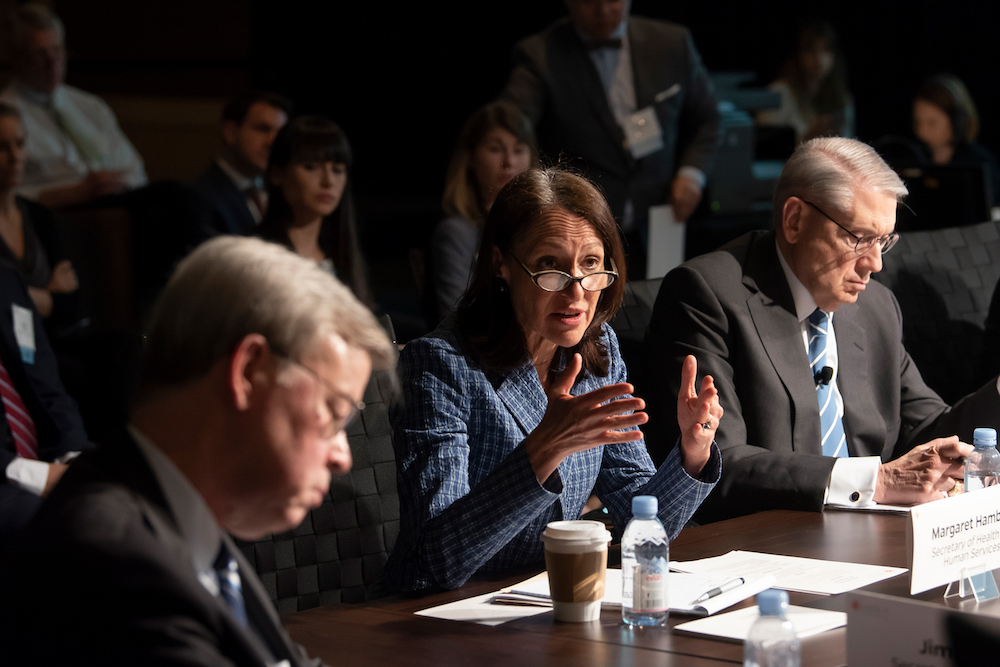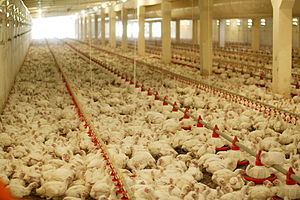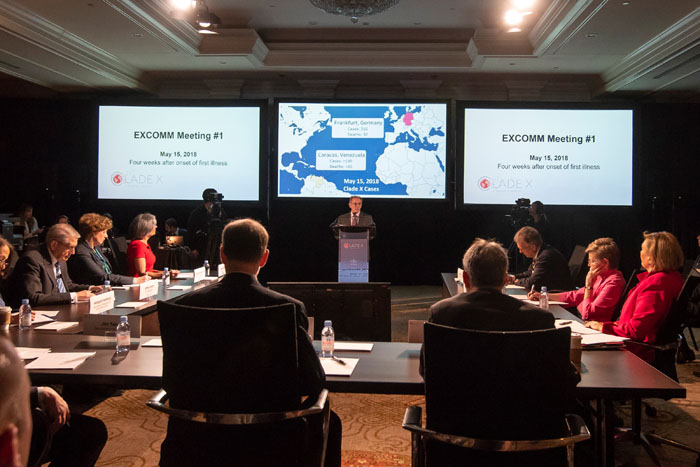biological holocaust
See the following -
'Moral Bankruptcy of Capitalism': UK’s Top Public Doctor Shames Western Society Over Ebola
Western countries should tackle drugs firms’ “scandalous” reluctance to invest in research into the virus which has already killed over 700 people in West Africa, the UK’s top public doctor said, adding, “They’d find a cure if Ebola came to London.” The pharmaceutical industry are reluctant to invest in research to produce treatments and vaccines “because the numbers involved are, in their terms, so small and don't justify the investment,” said Professor John Ashton, president of the UK Faculty of Public Health, an independent body for specialists in public health in the United Kingdom. Read More »
- Login to post comments
Blue Ribbon Study Panel On Biodefense Receives $2.5 Million Grant To Reduce Risk of Catastrophic Bioweapon Disease Outbreaks
 The Blue Ribbon Study Panel on Biodefense announced today a $2.5 million grant from the Open Philanthropy Project. The grant allows the Panel to continue its leadership role in assessing our nation’s biodefense, issuing recommendations and advocating for their implementation, and identifying viable avenues for needed change to policy. The grant comes amidst heightened global tensions as North Korea and other regimes seek to develop biological weapons. It also arrives on the 100th anniversary of a catastrophic influenza pandemic that took the lives of millions around the world, a stark reminder of the dangers of biological events.
The Blue Ribbon Study Panel on Biodefense announced today a $2.5 million grant from the Open Philanthropy Project. The grant allows the Panel to continue its leadership role in assessing our nation’s biodefense, issuing recommendations and advocating for their implementation, and identifying viable avenues for needed change to policy. The grant comes amidst heightened global tensions as North Korea and other regimes seek to develop biological weapons. It also arrives on the 100th anniversary of a catastrophic influenza pandemic that took the lives of millions around the world, a stark reminder of the dangers of biological events.
- Login to post comments
Clade X pandemic exercise highlights policies needed to prevent or reduce the worst possible outcomes in future pandemics
 The outbreak of a moderately contagious and moderately lethal novel pathogen precipitated a catastrophic end to the scenario in Clade X, the day-long pandemic tabletop exercise hosted by the Johns Hopkins Center for Health Security on May 15 in Washington, DC. Clade X simulated a series of National Security Council–convened meetings of 10 US government leaders, played by individuals prominent in the fields of national security or epidemic response. Their dialogue as the scenario unfolded addressed significant uncertainties in current prevention and response capabilities, hamstrung by policy challenges at the federal level.
The outbreak of a moderately contagious and moderately lethal novel pathogen precipitated a catastrophic end to the scenario in Clade X, the day-long pandemic tabletop exercise hosted by the Johns Hopkins Center for Health Security on May 15 in Washington, DC. Clade X simulated a series of National Security Council–convened meetings of 10 US government leaders, played by individuals prominent in the fields of national security or epidemic response. Their dialogue as the scenario unfolded addressed significant uncertainties in current prevention and response capabilities, hamstrung by policy challenges at the federal level.
- Login to post comments
Global Bio-Disaster Response Urgently Needed In Ebola Fight
World leaders are failing to address the worst ever Ebola epidemic, and states with biological-disaster response capacity, including civilian and military medical capability, must immediately dispatch assets and personnel to West Africa, the international medical humanitarian organization Médecins Sans Frontières (MSF) announced today in a special briefing at the United Nations organized by the office of the UN Secretary General and the World Health Organisation (WHO). Read More »
New Superbug Resistant To All Antibiotics Now Found Worldwide
 Last week, I shared scary news of a new gene called mcr-1 conferring resistance to our last-ditch antibiotic, colistin. The gene was found in China with spread to the Netherlands. I raised concerns, too, about imports of some foods from China. Several new reports in the Lancet Infectious Diseases suggest the spread of this newly found resistance gene, mcr-1, is far worse than it initially appeared. Here are the latest findings from several just-released studies...
Last week, I shared scary news of a new gene called mcr-1 conferring resistance to our last-ditch antibiotic, colistin. The gene was found in China with spread to the Netherlands. I raised concerns, too, about imports of some foods from China. Several new reports in the Lancet Infectious Diseases suggest the spread of this newly found resistance gene, mcr-1, is far worse than it initially appeared. Here are the latest findings from several just-released studies...
- Login to post comments
This mock pandemic killed 150 million people. Next time it might not be a drill
 A novel virus, moderately contagious and moderately lethal, has surfaced and is spreading rapidly around the globe. Outbreaks first appear in Frankfurt, Germany, and Caracas, Venezuela. The virus is transmitted person-to-person, primarily by coughing. There are no effective antivirals or vaccines...So began a recent day-long exercise hosted by the Johns Hopkins Center for Health Security. The simulation mixed details of past disasters with fictional elements to force government officials and experts to make the kinds of key decisions they could face in a real pandemic. It was a tense day. The exercise was inspired in part by the troubled response to the Ebola epidemic of 2014, and everyone involved was acutely aware of the very real and ongoing Ebola outbreak spreading in Congo.
A novel virus, moderately contagious and moderately lethal, has surfaced and is spreading rapidly around the globe. Outbreaks first appear in Frankfurt, Germany, and Caracas, Venezuela. The virus is transmitted person-to-person, primarily by coughing. There are no effective antivirals or vaccines...So began a recent day-long exercise hosted by the Johns Hopkins Center for Health Security. The simulation mixed details of past disasters with fictional elements to force government officials and experts to make the kinds of key decisions they could face in a real pandemic. It was a tense day. The exercise was inspired in part by the troubled response to the Ebola epidemic of 2014, and everyone involved was acutely aware of the very real and ongoing Ebola outbreak spreading in Congo.
- Login to post comments